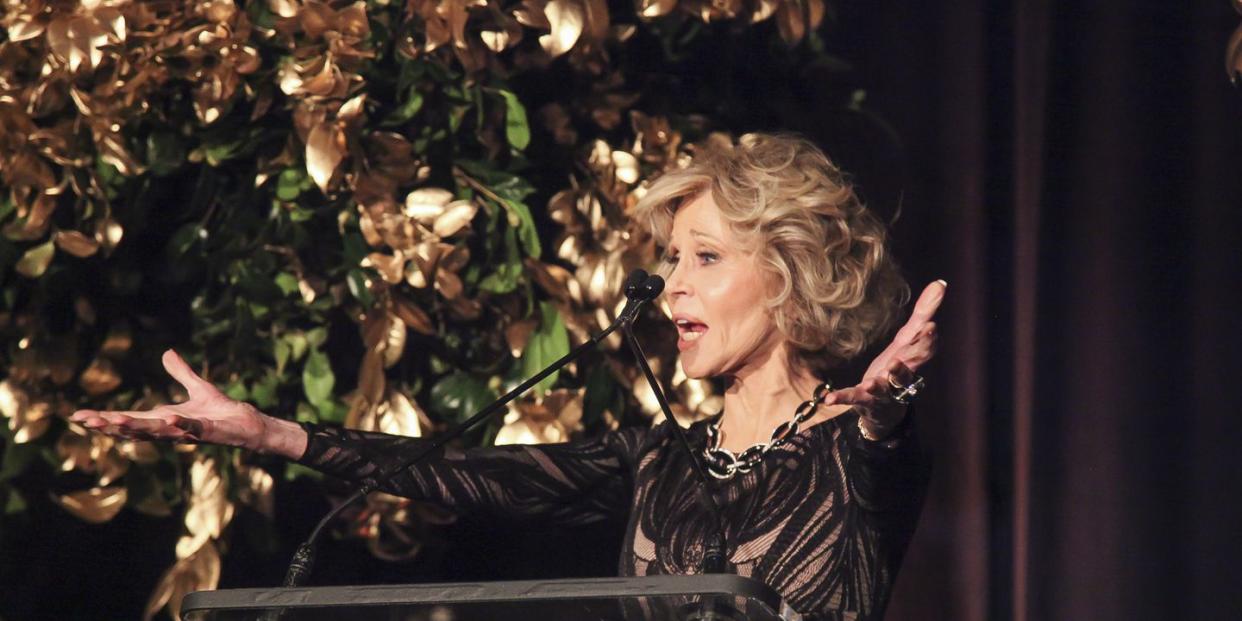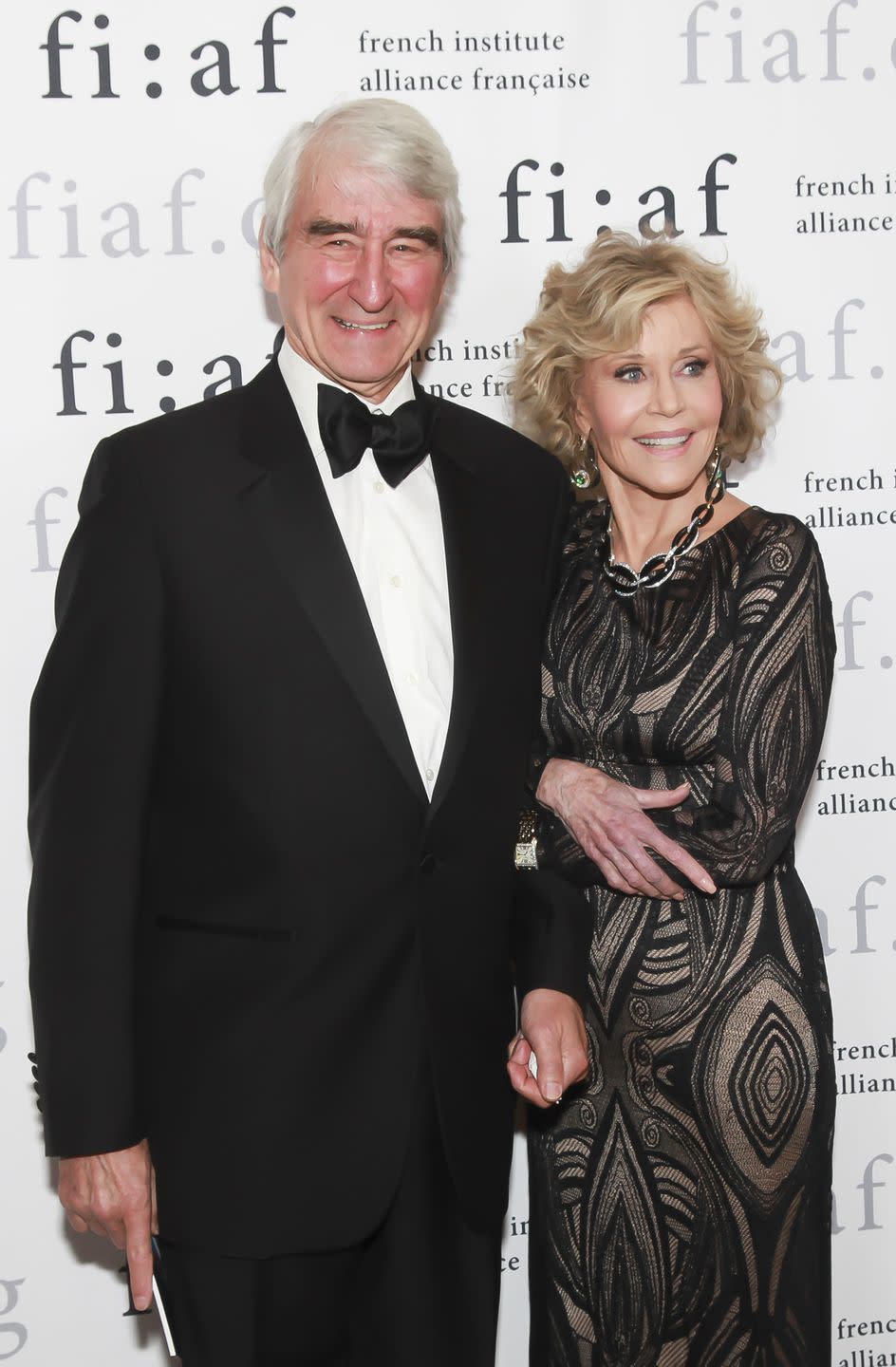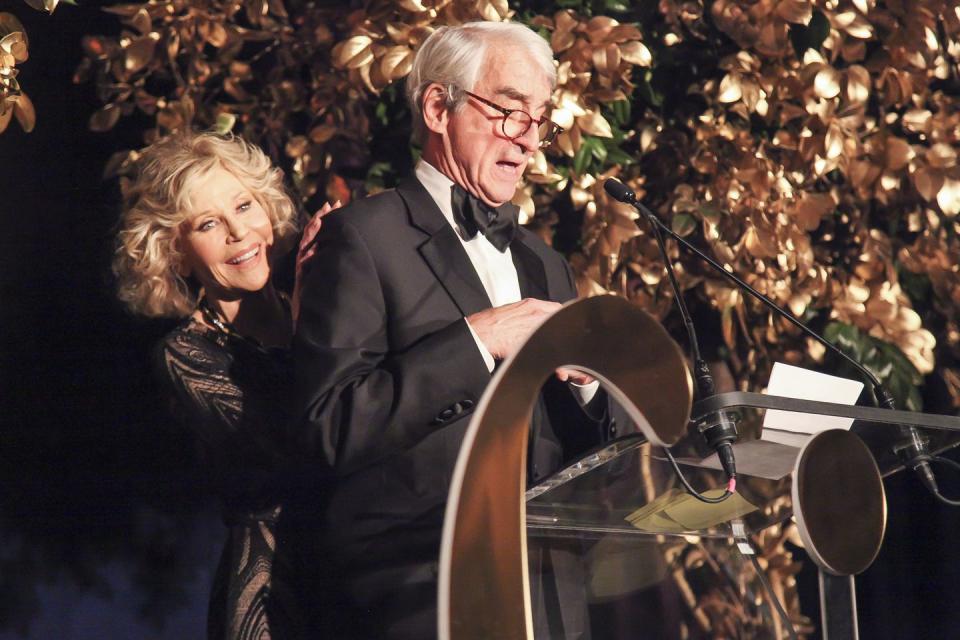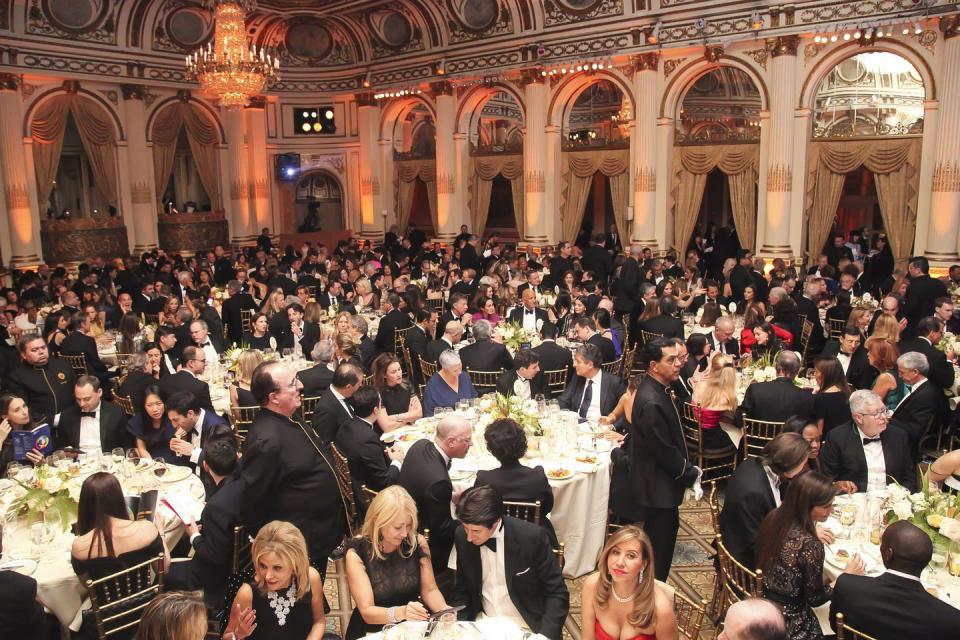Jane Fonda on Why Being 81 is Better Than Being 21

Add “Francophile” to the list of adjectives to describe the indefatigable Jane Fonda, the award-winning actress, activist, and Hollywood survivor who has had a love affair with the city of lights since her youth.
Monday night the Alliance Francaise, or FIAF, gave Fonda the Trophée de Arts, for exemplifying the organization’s mission of French-American friendship and cross-cultural exchange. Fonda accepted the award from actor Sam Waterston, her co-star on the hit Netflix series Grace and Frankie and she delivered part of her speech in French, no less.
“I work for L’Oreal Paris, and I am the oldest ambassador for skin care you’ve even seen. You’ve gotta love a company that hires an 81-year-old to do commercials for skin care… that’s another reason why I love the French, they love old women.” she said to a packed room at the Plaza Hotel, which included Jeff Koons and Nicholas Sarkozy.

Fonda sat down with Town & Country in the ballroom of the Plaza Hotel to talk about the midterms, what she loves most about filming Grace and Frankie, which will return next year for Season Five, and why she never wants to be young again.
How did you feel about the midterms?
I feel that we need to celebrate our successes, and we have a lot of successes. And it was very important.
Were there a few important ones to you?
The number of women that have been elected, the number of governorships that we won, and the number of state legislature that we flipped. I am just so impressed with the variety. This is such a diverse family of humanity that is representing us.
So, you are encouraged?
I am encouraged.
It seems very important to you to see so many women coming into politics. Why is that so?
Because women govern differently. It is evolutionary. I am generalizing because there are exceptions-there are women who feel that when they are in a position of power, they have to behave like men. That is less and less true. More and more, women are understanding the power of collaboration, even Republicans with Democrats reaching across the aisle and talking to each other in a collegial way, and learning from each other, and helping from each other. It is what we have always done since we were hunter-gatherers.
It looks that you are having fun on Grace and Frankie. Is that true?
I feel guilty that it is so much fun. I am having so much fun that it is hard to even call it work. I love Lily [Tomlin]. I deeply admire her. I go to work every day with a genius. That’s number one. Number two, I love having a regular job at 81, which is more than I can even believe. I keep pinching myself. I just love having a steady job-going through those studio gates every day is so great. We have a fabulous crew: a lot of women, a lot of people of color; a lot of the directors are women and then the writers are just wonderful.

I hate the word aging. Do the French have a better word for aging?
The French don’t have a better word for aging, but they have a way better attitude towards aging. I would say something about the French: they always love their aging actors. The Jeanne Moreaus, the Annie Girardots. In France, just because you are old, they don’t stop loving you.
What is about this “attitude” that the French have?
I think they haven’t been wounded by the notion that to be valuable you have to be young. It is an old civilization, it is an old culture, so of course, they appreciate what happens with experience and time. Things get better. And the French know that.
They know that youth is wasted on the young, right?
It is hard to be young, yes. Youth is wasted on the young. I would not want to be young for anything in the world. It is really hard to be young, and it is harder now than ever.

Why now?
Because of the economy-it is really hard to get good jobs. Because the world is in complete chaos and turmoil. Because the young people realize that we are destroying our planet and that they are going to be living through it. I won’t but they will. When you are young, everything is: "What if? Should I? Maybe I need to? What I am supposed to? What do I mean?" It is a lot of not knowing. When you are older, it is all that time behind you. You say: "It did not kill me then; it will not kill me now." You know, we don’t make mountains out of molehills. We know what is important, and we know what we can let go. We become lighter.
You certainly embody all of this.
Thank you. I have worked hard for that. And when I say that I have worked hard, I am not talking about superficial things, I am talking about the importance of living an examined life, an intentional life. You don’t become wise by having a lot of experiences: you become wise by reflecting on the experiences that you have had and understanding what their meanings hold for you in your life.
Tell us about your favorite places in Paris.
I love the Musée de Rodin. I love all the very very narrow cobblestoned streets. I have lived on some of them on the Left Bank, but I have also lived in the Marais, which in my day, when I lived there, was not at all gentrified. It was the center of Jewish life in Paris. And it was absolutely fascinating. My husband [Roger Vadim] and I lived in the attic of the Hotel des Ambassadeurs de Hollande owned by Paul-Louis Weiller [the founder of Air France]. The buildings in the streets of Le Marais and Rue Seguier were so old that they would lean in like they are whispering secrets to each other.
But then I also lived in a little farm house out in the country because the first time I ever went in the country of France, the walls in the villages, the moss on the stones, the colors of the stones just won my heart. The little villages are just like a butcher, a baker, vegetables, a bar, and a church-although today there was an article about how there are fewer and fewer mayors in the little towns. When we were taking the train back from Lyon to Paris recently, you could see why France is a country of food. It is rural; it is agricultural; it is not agribusiness. They are small farmers still. There is a lot to love.
Did you become a Francophile when you were living in Paris or was it just an evolution over the years?
I first went to Paris when I was 16. My father was going to Italy to make War and Peace with Audrey Hepburn, and first we stopped in Paris. So, it was my first European city, and I was smitten. Everything about it-the cafés, the food, les fraises des bois with crème fraiche. I just loved everything. I studied French in those days. So, I kind of knew academic French, and I kept going back as I grew up.
('You Might Also Like',)
